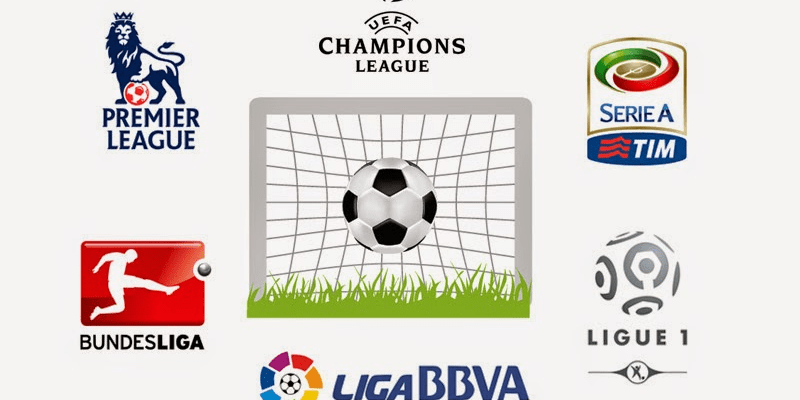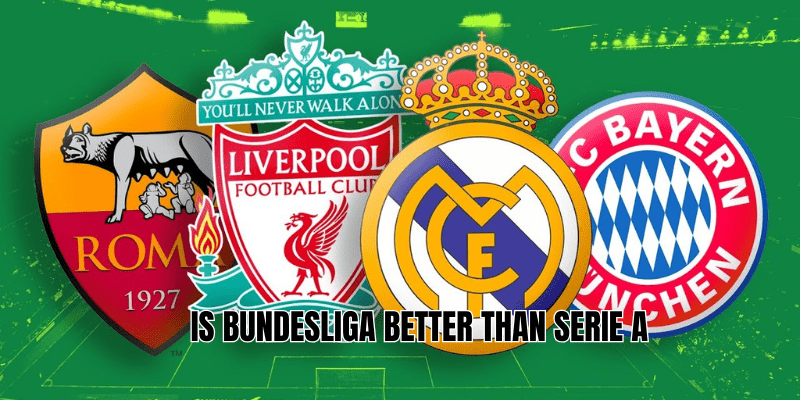When comparing Bundesliga vs Serie A, the answer isn’t clear‐cut. At BraeckBall, we believe that whether the Bundesliga is better than Serie A depends on what you value: atmosphere, finances, competitiveness, or style. Below, we explore how these two giants of European football stack up in 2025 — their advantages, drawbacks, and which league “wins” in different arenas.
What fans and experts care about

Before diving in, let’s list key criteria people use to compare:
- Domestic & European competitiveness
- Budget, TV & media revenue
- Stadium attendance & fan experience
- Quality of play and star players
- Youth development & long‐term sustainability
Bundesliga’s Strengths Over Serie A
Here are areas where the Bundesliga pulls ahead or shows strong performance compared to Serie A.
TV revenue & financial power
- The Bundesliga’s domestic media rights for the 2025-26 to 2028-29 cycle amount to ~ €1.121 billion per season for the 36 clubs across Bundesliga 1 & 2. This ranks among the strongest in Europe.
- Serie A has a broadcast deal from 2024-2029 with DAZN + Sky Italia worth about €4.5 billion over five years, i.e. about €900 million/year. That’sable but still below Bundesliga’s domestic income in absolute terms.
Attendance & fan atmosphere
- Bundesliga remains among the top leagues for average attendance in Europe. In 2024-25 the German top flight averaged ~ **38,662 spectators.
- Serie A’s average attendance is lower (roughly 30,800-31,000 per match recently) though improving.
- German clubs often have more fan-friendly pricing, which helps maintain high occupancy and atmosphere.
Consistency & performance in Europe
- Bundesliga clubs regularly go deep in UEFA competitions, with Bayern Munich as perpetual contender, and other clubs like Borussia Dortmund, Bayer Leverkusen, RB Leipzig also contributing.
- Their performance in coefficients tends to keep Germany high among Europe’s top leagues.
Serie A’s Advantages vs Bundesliga

Where Serie A shines, often in more subtle or stylistic ways.
Tactical tradition & star power
- Serie A still boasts clubs with strong history: Juventus, Napoli, AC Milan, Inter. Their tactical approach, defensive richness, and experience in big matches are still highly respected.
- The league often attracts and develops world‐class talent, both in senior and youth levels, though financial constraints affect buying power.
Revenue growth & modernization efforts
- Serie A’s total league revenues are increasing. In 2023-24, collective revenues for the 20 Serie A clubs rose to around €3.8 billion, up.
- The new Italian domestic broadcast rights deals (DAZN + Sky) beginning 2024-25 aim to modernize how matches are distributed, increase global reach, and improve competitiveness. ompetitiveness.
Improved attendance & fan reengagement
- Fans in Italy are returning to stadiums more, and Serie A is seeing booming attendance seasons after pandemic restrictions lifted. While not yet matching Bundesliga’s numbers, the gap is narrowing.
- Certain clubs in Serie A (especially Milan, Napoli, Juventus) still draw massive crowds and maintain strong home advantage.
Where the Edge Lies: Kurzvergleich (Quick comparison)

| Criterion | Bundesliga Strength | Serie A Strength |
| TV / Media revenue | Higher domestic rights revenue; robust contracts. | Growing contracts; improving global rights; still trailing slightly. |
| Stadium attendance & capacity | Very high average attendance; great fan infrastructure. | Rising attendance; passionate fanbases; some stadiums still lag. |
| Competitive consistency in Europe | Regular deep runs in Champions League; stable finances. | Occasional peaks; some clubs struggle financially or in Europe. |
| Style, tactics, heritage | Modern high-press, attacking, youth promotion. | Rich tactical history; defensive traditions; iconic clubs. |
| Financial risks | Generally solid; good regulation. | Some instability; piracy, declining rights value in cycles. |
Weaknesses of Both
Neither league is perfect. Some issues they share or uniquely struggle with:
- Serie A faces challenges with financial losses, lower revenue compared to top leagues like Premier League, issues with infrastructure in some stadiums, and irregularities in distributing TV revenue. Piracy is also a problem in Italy which undermines income.
- Bundesliga has less “big-market” global brand appeal compared to Serie A or LaLiga in some international markets; also less star transfer spending than Premier League perhaps. Some clubs outside the top few can’t compete financially.
Final verdict: Is Bundesliga better than Serie A?
BraeckBall’s view? Yes, the Bundesliga currently holds a slight overall edge in several measurable areas: attendance, domestic revenue, stability, and fan atmosphere. But it’s close — and Serie A is making strong moves to close the gap, especially in revenue growth, attendance, and quality of play.
If your priority is numbers (financials, fan turnout, consistent European performance), Bundesliga may be “better.” But if you value tactical nuance, historic prestige, defensive mastery, or the romantic side of Italian football, Serie A still has a lot to offer.
Conclusion
BraeckBall believes that while the Bundesliga is better than Serie A in many current aspects — especially financial clout, attendance, fan experience, and consistency — Serie A is far. The keyword “is Bundesliga better than Serie A” captures a debate where both leagues are evolving, each excelling in different dimensions.
If you’re a fan, you might prefer one over the other depending on what moves you: is it the roar of the crowd, the tactical chess matches, or the drama of Champions League nights?
What now? If you want, I can pull up 2025-26 season forecasts: player value, predicted Champions League performance, which league might grow faster — let me know which angle interests you most!







